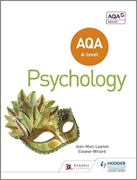Psychology
Psychology is a fascinating science concerned with the study of the mind and human behaviour. It attempts to explain why we behave in certain ways, in particular situations. In order to do this, it considers the role of our biology, such as genetics and biochemistry, the role of our thought processes, our previous experiences, as well as the behaviours we learn from those around us.
It has links with biological and forensic sciences, as well as with the humanities such as sociology, philosophy and literature. The common factor linking people who study psychology is curiosity and the search for knowledge.
Psychology is a very popular subject choice, and students find it exciting, interesting and challenging. Lessons encourage students to be able to think critically for themselves and engage in debates around the potential reasons for human behaviours.
| Exam Board | AQA | Please click here |
Tring School Sixth Form
|
Minimum GCSE Grade Requirements (all subjects listed are required) |
|
Tring School A Level Psychology | please click here
Future opportunities
Psychology has a broad range of real world applications in everyday life, ranging from managing stress, health and mental illness, as well as understanding personal development, social interaction and the influences in our environment.
Psychology offers good career prospects. There are a wide range of possible careers in psychology including: therapists and counsellors, mental health professionals, child psychologists, sports psychologists, occupational psychologists, and educational psychologists. The skills you learn will also readily transfer to many other careers. These skills include oral and written communication, computer literacy, numeracy, problem-solving and the ability to carry out independent research. Therefore the jobs these skills support are many and varied. They range from health and social welfare occupations, such as teaching, nursing, policing etc. to professional and managerial jobs, such as Chartered Accountant and Marketing Manager. Graduates have also entered administration, information and resource management work, sales, retail and the media.
There are many careers that you can go into following a degree in psychology!
Course Textbooks
Course textbook that we recommend for students is:
AQA A Level Psychology (Year 1 and Year 2) by Jean-Marc Lawton & Eleanor Willard
ISBN-13 : 978-1510483019
Course Content & Assessment
Course content
We follow the AQA A Level specification for Psychology, which we believe offers students a solid grounding in the fundamentals of psychology and offers a range of interesting topics for them to learn about.
Please look at this link for Psychology (7181, 7182) on the AQA website
The A Level course covers a range of approaches to Psychology and explores the research methods used by psychologists. 10% of questions will require mathematical knowledge and the ability to apply it. You will study the following topics:
- Paper 1: Memory, Attachment, Social Influence, Psychopathology (Phobias, Depression & OCD)
- Paper 2: Biopsychology, Approaches in Psychology, Research Methods
- Paper 3: Relationships, Schizophrenia, Aggression, Issues and Debates in Psychology
Assessment
Written examinations at end of year 13
The whole course will be assessed in THREE exams, each lasting 2 hours:
- Paper 1: Memory - Social Influence - Attachment - Psychopathology
- Paper 2: Approaches in psychology - Biopsychology - Research methods
- Paper 3: Issues and debates in psychology - Relationship - Schizophrenia - Aggression
Able & Ambitious and Wider Reading
Able & Ambitious
In Psychology we believe that it is essential for students to proactively read around the subject area, and be independent in their learning. Psychology is a large field with new research constantly being published. By reading around the subject and staying abreast of new research findings, Psychology becomes more alive and relevant in terms of everyday life. Students have access to our Psychology website which includes our ‘super curriculum’, with a wide range of suggestions for independent learning tasks. Journal articles are also made available in the classroom for students to help themselves to. A link to the Psychology super curriculum is available here.
ENRICHMENT AND EXTRA-CURRICULAR
The Psychology department offers students ample opportunity to extend their subject learning and to enthuse and inspire the students in the broader significance of this subject.
The Year 12 students have an annual trip to London for the fascinating ‘Psychology in Action: The Power of the Mind’ conference. In Year 13 we likewise aim to to enrich the curriculum offering students the opportunity to attend a ‘Brain Day’ neuroscience workshop with a visiting neuroscientist, which includes a demonstration of a sheep’s brain being dissected. We also endeavour to run careers related talks in school, delivered by professional psychologists.
PSYCHOLOGY TEAM
| Subject Leader | Miss A Esland |
| Miss M Burns |

